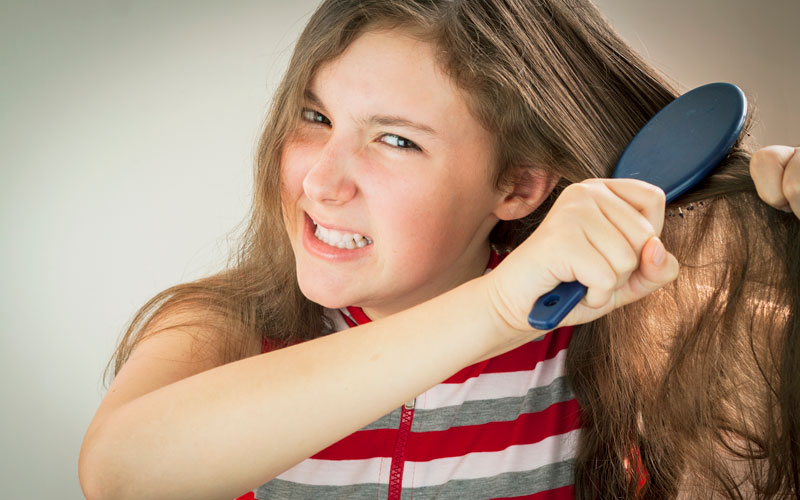Kids can Wash Their Hands, but do They Know how to Care for Their Entire Body?
There’s no question that handwashing is something children have learned to ace in our present pandemic reality. In the last year, they’ve been exposed to an abundance of handwashing awareness campaigns from the CDC, health departments, and other healthcare organizations. Not to mention from their parents!
With hand sanitizer pumps at the ready wherever children go, their hands might be germ-free and clean, but what about the rest of their bodies? With social interactions limited, you may find your child less motivated to adhere to hygiene practices, but pediatricians say there are important reasons to maintain cleanliness. (Even if immediate family members are the only ones who notice!)
I have several kids. Most of them practice good hygiene and have some level of care about their appearance and health. But I’ve got one kid who is on the verge of making plants wilt as she walks by. She likes to wear the same stinky sweatshirt for days on end, thinks deodorant is optional, and her relationship with the toothbrush ended long ago.
How on earth do I get her to care about herself? Today when I dropped her off at school, I noticed she was wearing that same stained sweatshirt, again. Not even peer pressure is working on this kid.
“Convincing your child that they need to bathe, wear deodorant, and brush their hair, even if they aren’t seeing anyone outside the family, can be a chore,” says Metro Health – University of Michigan Health pediatrician Dr. Dawn Rosser. “I struggle with this in my own family. But common hygiene practices are an important part of overall health, both inside and outside the home.”
So, what does appropriate hygiene for kids look like across different age groups? Dr. Rosser shares some helpful guidance. It’s not meant to be an exhaustive list, but rather offers general good practices for parents to follow.
Hygiene Tips for Kids, by Age
Should I wash my baby’s hands like I do my own? At what age should my kid be brushing his own teeth? When does deodorant come into play?
I’ve asked myself all these questions, and more. Hygiene is so second-nature for me that I forget that kids need to be regularly taught new skills as they get older.
Here’s what hygiene for kids should look like in each age group.
Baby Hygiene Recommendations
Hygiene for babies falls completely to parents. Parents should make sure their infant is bathed and diapers are changed. These practices help ensure babies avoid diaper rash and other skin irritations. Additionally, clean clothes and occasional nail trimming will keep mom and baby happy and healthy.
Ages 2–4 Hygiene Recommendations
Once a child is potty trained, parents can add a couple more practices into the hygiene arsenal. Parents should encourage handwashing, teeth brushing, and continue with regular bathing. For this age group, it’s still essential for parents to take the lead in establishing routine hygiene practices.
Preschool age Hygiene Recommendations
At this age, children begin taking direction and can think for themselves. Parents should encourage children to cover their mouths when they cough, or sneeze, and wash their own hands after using the bathroom. Children should use a tissue if they need to blow their noses. The same practices of regular bathing, teeth-, and hair brushing, handwashing, and clean clothes apply as well.
Ages 5-10 Hygiene Recommendations
This age group has much more autonomy when it comes to hygiene, but that doesn’t mean they practice it without being told. “My eight-year-old daughter has no problem bathing and keeping clean, but she cannot remember to brush her hair,” Dr. Rosser shares with a laugh. “Every day is a battle to remind her to brush it. I even keep a brush in the kitchen so we can untangle the knots and tangles at any time.”
Children at these ages probably have a routine of bathing a couple times a week, if not more, and understand they need to brush their teeth twice a day and put on clean underwear every day. If they aren’t in the habit of flossing yet, Dr. Rosser suggests parents add that to their child’s routine.
Ages 11-18 Hygiene Recommendations
Kids in this age group are experiencing a lot of changes. At the early end, the male and female sex hormones kick in and puberty begins. Teens and pre-teens start growing body hair, body odor is noticeable, and the hair on their heads is getting more oily. Because of all of this, keeping clean is more important.
“Because of peer pressure to be clean and avoid body odor, most kids understand that they need to wear deodorant and shower more often,” Dr. Rosser points out. “Occasionally, teens won’t care about showering or washing their hair. If that is the case, when that child comes for his or her yearly physical, we talk about it and determine if there are other health conditions or barriers at play.”
Girls and boys in this age group also start shaving. Boys might need help learning how to shave their facial hair safely, and girls may need guidance for shaving their legs and armpits. Both genders will also need to keep their genital areas clean with soap and water when bathing.
Why Hygiene for Kids is Important
For the most part, if a child is reluctant to stick to appropriate hygiene practices, it doesn’t mean he or she will suffer serious health consequences. Dr. Rosser says there are some studies that show poor dental health can put people at risk of heart issues, but in general, poor bodily hygiene can lead to:
- Build-up of oil and bacteria on the skin and hair
- Skin infection or rash
- Acne
- Viral infections (cold, flu, pink eye, stomach virus, etc.)
- Scabies
- Lice
- Athlete’s foot
- Ring worm
- Pin worm
- Fungus
- Dental decay
“Good hygiene is an important part of overall health and wellness,” explains Dr. Rosser. “If a child looks and feels his/her best, it can boost confidence and self-esteem. We also know kids can be cruel, and children who appear unkempt may face bullying. If you can begin proper hygiene at a young age, and encourage it through your child’s teen years, it will hopefully become a lifelong practice into adulthood.”
I’m hopeful for my messy, “could care less” kid. I had a sister like this, and she grew into a beautiful, smells-good adult who brushes her teeth. There is hope. We’ve just got to keep encouraging our kids!
For parents looking for resources and tips, Dr. Rosser suggests taking a look at these books:
- The Care and Keeping of You, by American Girl Library
- I Don’t Want to Wash My Hands, by Tony Ross
- What are Germs?, by Katie Daynes
- A Germ’s Journey: Dirty Hands! Clean Hands!, by Katie Laird & Sarah Younie
- Personal Hygiene? What’s that got to do with Me?, by Pat Crissey
- Boy’s Body Book, Kelli Dunham
FEATURED PARTNER
Driven by our passion to put you first, Metro Health – University of Michigan Health is changing the face of health care in West Michigan. Whether you’re seeing your family doctor for a physical or working with a specialist to treat a chronic condition, our integrated health care system is designed to give you easy access to high-quality, personalized care.


